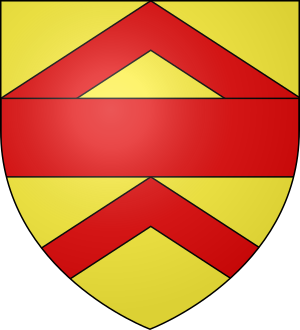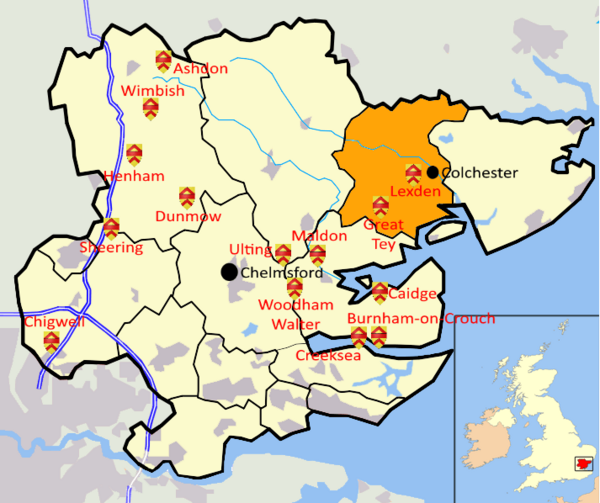John FitzWalter, 2nd Baron FitzWalter facts for kids

John FitzWalter, 2nd Baron FitzWalter (born around 1315 – died 18 October 1361) was an important landowner in Essex, England. He is mostly remembered for causing trouble, especially around the town of Colchester. His family was very old and noble, connected to the powerful de Clare family who came to England during the Norman conquest of England. The FitzWalters owned lands all over Essex, and also in London and Norfolk. John FitzWalter played a big part in the early years of King Edward III's wars against France, known as the Hundred Years' War. He was married to Eleanor Percy, whose father was Henry, Lord Percy.
John FitzWalter gathered a group of powerful friends and followers around him. These were mostly important people from the local area, but also included others, like a priest from Norfolk. With this group, FitzWalter started an armed campaign against the nearby town of Colchester. This happened almost as soon as he became an adult. The people of Colchester might have made things worse by going into FitzWalter's park without permission. In return, FitzWalter stopped them from using one of their own watermills. Then, in 1342, he surrounded the town, stopping anyone from entering or leaving for several weeks. His group also damaged a lot of property and ruined the market. One historian said he was like a modern-day gangster in medieval times. Other people who suffered from his group in Essex included local jury members, royal officials, a man forced to leave the country, and the head of Little Dunmow Abbey.
FitzWalter sometimes went back to France to fight in the war. Even though he served the king – he was also part of the king's special group of advisors and went to parliament regularly – he never held a royal job in his home county. Historians think this was because he often broke the king's peace and took over the king's authority. FitzWalter was too powerful and too aggressive in protecting his rights for local people to challenge him in court. It wasn't until 1351 that he was finally brought to justice. The King sent a special group to Chelmsford to look into many problems, including FitzWalter and his group. Most of his followers received little or no punishment. However, FitzWalter himself was arrested and sent to London. He was immediately put in prison. He stayed in the Tower of London for over a year until the King agreed to forgive him. FitzWalter was set free and got his lands back. But he had to buy them back from the King for a huge amount of money, over £800. FitzWalter died in 1361, still paying off this fine. He left a son, Walter, as his heir. Lady FitzWalter had died before him. They were both buried in Dunmow Priory.
Historians have looked at FitzWalter's actions as showing how the disorder of the 1400s actually started in the 1300s. While historians often see his activities as a sign that King Edward III struggled to keep law and order, FitzWalter's downfall shows that royal justice could be strong when it chose to be, even if it wasn't always fast.
Early Life and Family
The FitzWalter family was a very rich and old family in northern Essex. They were descendants of the Lords of Clare, who came to England during the Norman conquest of England. The family's lands were mostly around Dunmow. They also owned lands as far away as Woodham in the southeast of the county, Chigwell in the southwest, Diss in Norfolk, and Castle Baynard in London.
John FitzWalter was the son, and probably the only son, of Sir Robert FitzWalter and Joan, daughter of Thomas, Lord Moulton. The family was known for being "warlike as well as rich" even before John was born. For example, an ancestor, also named Robert, was a main rebel against King John in the early 1200s.
John FitzWalter was about 13 years old when his father died in 1328. A historian named Christopher Starr suggests that John was raised by his mother, who was now a widow. This might have made him "a difficult and dangerous adult." By law, he couldn't get his family's property until he was 21. However, King Edward III allowed him to take control of his lands and titles a little early, in 1335, when FitzWalter was about 20.
FitzWalter received control of two-thirds of his inheritance. The rest was kept by his mother as her dower, which was land set aside to support her. This was a large part of the FitzWalter family's wealth. Wanting to get even richer might have led to FitzWalter's later actions that caused trouble. He had money problems in London over lands that his grandfather, Robert, had given away in 1275 to help start Blackfriars Abbey. Robert had kept rights to some other city properties. But the city authorities successfully challenged this. Both Robert and John tried many times to claim these properties. According to an old writer, John's demands were strongly refused by the mayor and city council in 1347.
The FitzWalter family was also traditionally in charge of defending London. In times of war, the Baron FitzWalter was supposed to go to St Paul's Cathedral with 19 knights. There, he would receive the city's flag, and London's soldier-citizens would march with him. A historian named Caroline Barron says that while this might be a "fanciful tale," FitzWalter was paid £20 each year for this role. By the 1300s, though, the city had its own army. The city leaders no longer thought the position was important, so they took away FitzWalter's special rights and payment. Despite these money troubles, as an important landowner in Essex, John FitzWalter was seen as the "rich kid" of his time in Essex society, according to historian Gloria Harris.
Royal Service and War
Relations between England and France had been difficult for many years. In 1337, a big problem started when the king of France, Philip VI, took control of the Duchy of Aquitaine. This land belonged to the English kings. In response, King Edward invaded France, starting the Hundred Years' War. Historian Gloria Harris said that young men like FitzWalter were "untapped pools of genteel manpower," meaning they were powerful young noblemen the King wanted to use. FitzWalter was called, along with 43 other Essex knights, to gather in Ipswich in December 1338. Ready to fight, FitzWalter joined the group of William de Bohun, who had recently become the Earl of Northampton.
FitzWalter became known as a good soldier during Edward III's early campaigns. He went back to fight in France many times during his career. For example, in 1346, he no longer served under Northampton. Instead, he served with the Prince of Wales. FitzWalter agreed to serve the Prince for six months for a payment of 100 marks. In return, he brought the Prince 20 armed men (himself, four other knights, and 15 squires) and 12 archers. As part of the Black Prince's leading group, FitzWalter fought at the siege of Calais in 1346. By this time, he was an experienced soldier and had been made a knight banneret, a high rank for a knight. He was still fighting in France in 1348, having returned to Northampton's service.
FitzWalter often came back to England to attend parliament, which is like a government meeting. He was first called to parliament in 1340 and attended every meeting for the next 20 years. He was also a royal councillor, meaning he advised the king. He was appointed in 1341 and served until 1358. In 1342, FitzWalter was one of 250 knights who took part in a big tournament held at Dustable. His later partner in causing trouble, Sir Robert Marney, was also there.
At some point, FitzWalter married Eleanor, the second daughter of Henry Percy, Lord Percy. They had at least two children: Walter, who would inherit his titles, and a daughter named Alice (who died on 11 May 1400). Alice married Aubrey de Vere, 10th Earl of Oxford, but we don't know if this happened while her father was alive.
Later Life and Legacy
Because of his violent actions in Essex, even though he was in parliament and on the king's council, John FitzWalter never held a royal job in his home county. He was also not appointed to any of the king's special groups there.
FitzWalter died on 18 October 1361. He was buried next to his wife and ancestors in Dunmow Priory. Eleanor had died before him, but not long before. His mother was still alive after him, and she still controlled a third of his family's property. On the day FitzWalter died, he still owed the king a very small amount of money from the large fine he had to pay ten years earlier. His son Walter took over his lands and titles. Walter was born in 1345, which was "at the height" of his father's troublesome activities. Unlike his father, Walter was a loyal servant of the king. He helped to stop the Peasants' Revolt in Essex for King Richard II in 1381. Walter also became a close friend of his brother-in-law, the Earl of Oxford, during the politically difficult years towards the end of Richard's reign.
Historians like Elisabeth Kimball say that the actions of men like John FitzWalter, who ignored the law, show that the lack of good government in the 1400s actually started in the 1300s. Historian G. L. Harriss argues that FitzWalter was "flawed in character" and from a young age was on a "downward spiral of violence." This meant he lost the protection of both the king and the other local noblemen. People like FitzWalter have often been seen by historians as showing that King Edward III had a poor record with law and order. However, another historian, Ormrod, suggests that even though royal justice might have been slow, it was still sure and harsh when it finally came.
 | Dorothy Vaughan |
 | Charles Henry Turner |
 | Hildrus Poindexter |
 | Henry Cecil McBay |


